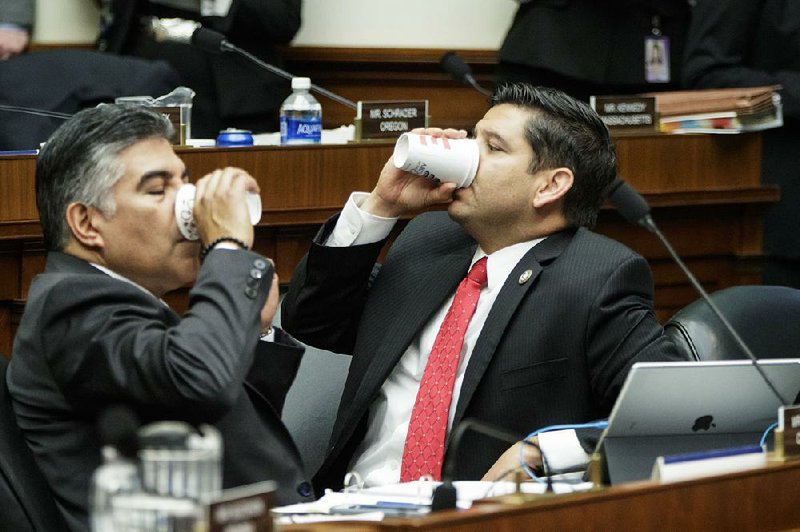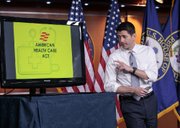WASHINGTON -- Two key House committees have approved a Republican proposal to revise the Patient Protection and Affordable Care Act, giving the bill its first victories during a backlash that Republican leaders and President Donald Trump are trying to tamp down.
The House Ways and Means Committee voted 23-16 to advance the American Health Care Act shortly before 4:30 a.m. Thursday after about 18 hours of debate. The House Energy and Commerce Committee voted 31-23 to advance the bill at 1:45 p.m. after about 27 hours of debate.
"Today, the House took a decisive step forward in fulfilling a promise to the American people that has been years in the making: repealing and replacing 'Obamacare' with affordable, patient-centered reforms," Energy and Commerce Chairman Greg Walden, R-Ore., said after the vote.
The bill's fast pace has drawn criticism from Democrats, who contrasted it with the lengthy deliberations that took place before passage of the Affordable Care Act. Some Republicans, including Sen. Tom Cotton, R-Ark., also questioned the rush to approve the bill.
[INTERACTIVE: Compare new health care proposal with Affordable Care Act]
In a series of pre-dawn Tweets on his personal Twitter account Thursday, Cotton panned the measure, writing:
"1. House health-care bill can't pass Senate w/o major changes. To my friends in House: pause, start over. Get it right, don't get it fast."
"2. GOP shouldn't act like Dems did in O'care [Obamacare]. No excuse to release bill Mon night, start voting Wed. With no budget estimate!" He was referring to the nonpartisan Congressional Budget Office's estimate of how the bill will affect the federal deficit.
"3. What matters in long run is better, more affordable health care for Americans, NOT House leaders' arbitrary legislative calendar."
[PRESIDENT TRUMP: Timeline, appointments, executive orders + guide to actions in first 100 days]
Cotton's criticism continued after sunrise. He told CNN's Jake Tapper that lawmakers should pause and take their time.
"There's no urgency here. There's no deadline. We need to get health care reform right. We don't have to get it fast," he said.
"What we need to deliver on is the promise that we would make health care more affordable for Americans, we would make it accessible and we would cut down on the stress and anxiety that health care causes for Americans. Unfortunately, the House legislation is not going to achieve those results, and the breakneck spread at which it's moving is designed to actually make those results probably worse," he said.
In a Thursday afternoon interview with The Washington Post, Cotton threw more cold water on the fast pace with which House Republicans are moving ahead on the bill and the measure's substance, including the proposed tax credits to help people pay for insurance.
"I don't think the Senate would vote on that bill," he said. "The bill that was introduced Monday night cannot pass the Senate. And I don't think it will be brought to the Senate for a vote."
Cotton said many of his colleagues hold similar views. "They might not have spoken publicly about it, but I can tell you a number if not a majority of Republican senators think that this process has been too breakneck, too slapdash, and they do not see a good solution for the American people coming out of the House bill as drafted."
Cotton is the second member of the Arkansas congressional delegation to oppose the GOP health care legislation. Rep. Rick Crawford rejected it the day after it was released.
"I can't support the American Health Care Act proposed by Republican leadership because it doesn't fully repeal Obamacare, which is primarily why my constituents sent me to Washington," Crawford said in a written statement released Tuesday evening.
Crawford expressed concern that the legislation would create a new government entitlement and add to the national debt.
"Arkansans need health care reform that eliminates failed policy and starts from scratch, giving conservatives a real opportunity to create an environment for the free market to address the problems in our health care industry. ... I am eager to support a bill that truly reforms health care for my constituents and the American people, but I can't support this bill in its current form," he said.
Other members of Arkansas' all-Republican congressional delegation said they were still studying the measure, although Rep. Steve Womack said the legislation would be an improvement over the current system.
On Thursday, Womack spokesman Claire Burghoff said the representative is "closely watching the changes made to the legislation by the committees of jurisdiction," adding, "Congressman Womack knows this is just the first step in the process."
Sen. John Boozman, R-Ark., believes the legislation's substance is more important than its speed, his spokesman, Patrick Creamer, said Thursday.
"We are in the very early stages of debating a replacement for Obamacare. There is a lot at stake, and given that health care is 18 percent of our economy, the senator supports taking the time to get it right," Creamer said.
Rep. Bruce Westerman, R-Ark., believes the current legislation can be improved.
"As this bill works its way through committees and eventually to the House, I will continue to ask questions, seek counsel from my constituents, and offer suggestions and amendments -- if possible -- to make this bill better," he said in a written statement.
No budget estimate
Senate Majority Leader Mitch McConnell, R-Ky., said lawmakers need to see the Congressional Budget Office's estimate.
"I think we need to know that," McConnell said at a breakfast sponsored by Politico, adding that the budget office's report could be released by Monday.
McConnell was the first in a growing chorus of high-ranking Senate Republicans to question the wisdom of moving forward on the health bill without an official budget tally. Senate Finance Committee Chairman Orrin Hatch, R-Utah, whose committee will help craft a Senate response to the House legislation, told reporters Thursday that he believes the budget office's score is a valuable tool.
"I think it's important," Hatch said. "It's the best we have."
The comments Thursday added uncertainty to the bill's chances in the Senate, if it passes in the House. Four GOP senators in states that accepted Medicaid expansion under the Affordable Care Act have expressed concerns about changing the way the program is administered.
One of those senators, Rob Portman of Ohio, reiterated his concerns Thursday after meeting with Vice President Mike Pence, and Health and Human Services Secretary Tom Price.
"That concerns me if it provides less certainty for the expanded Medicaid," Portman said. "We'll see."
Facing a barrage of bipartisan criticism, Trump sought to calm fears about the process.
"Despite what you hear in the press, health care is coming along great," he tweeted midday Thursday. "We are talking to many groups and it will end in a beautiful picture!"
Trump dined Wednesday night with Sen. Ted Cruz, R-Texas, a skeptic of the bill, and kept up his wooing efforts Thursday, inviting two influential House conservatives to lunch at the White House.
One of them, Rep. Mark Meadows of North Carolina, who chairs the House Freedom Caucus, said afterward that there are still "major concerns that need to be addressed, but I really appreciate the president's willingness to consider issues that are important to all Americans."
The measure also is taking fire on the right from Rand Paul, R-Ky., and Mike Lee, R-Utah, who say they want a more complete repeal of the Affordable Care Act.
Making the pitch
On Capitol Hill on Thursday, House Speaker Paul Ryan made a new attempt to explain the full scope of the GOP health plan, explaining in an unusual "TED talk"-style news conference that the pending legislation is only the first step.
The proposal, he explained, is to be followed by Trump administration regulatory actions, as well as additional legislation that will need to win at least some Democratic support in the Senate.
"We as Republicans have waited seven years to do this," Ryan said. "This is the closest we will ever get to repealing and replacing Obamacare. The time is here. The time is now. This is the moment."
Senate Democrats expressed their concerns in a separate news conference, attacking the GOP for allowing the process to take place in the "dead of night." They were flanked by people who had benefited from the Affordable Care Act.
House Republican leaders have given little indication that they will make anything but marginal changes to their plan, which would eliminate the requirements that all Americans obtain coverage or pay a tax penalty and that businesses with at least 50 employees provide insurance.
The American Health Care Act would replace income-based subsidies with refundable tax credits based on age and income, impose a 30 percent surcharge if people buy a plan after allowing their coverage to lapse and phase out the law's more generous Medicaid funding over time.
The extra billions Washington has sent states to expand the federal-state Medicaid program would phase out, and spending on the entire program would be capped at per-patient limits. About $600 billion in 10-year tax boosts that former President Barack Obama's statute imposed on wealthy Americans and others to finance his plan would be repealed.
Insurers could charge older customers five times more than younger ones instead of the current 3-1 limit but would still be required to include children up to age 26 in family policies, and they would be barred from imposing annual or lifetime benefit caps.
Democrats said the Republicans would yank health coverage from many of the 20 million people who gained it under Obama's statute, and drive up costs for others because the GOP tax breaks would be skimpier than existing subsidies. And they accused Republicans of hiding bad news by moving ahead without official estimates from the nonpartisan Congressional Budget Office on the bill's cost to taxpayers and its anticipated coverage.
Even as Republican leaders expressed confidence over the revision, obstacles remained. A growing coalition of interest groups has lined up in opposition, including AARP and numerous medical professionals, from mental-health providers to doctors, nurses, hospitals and more.
Republican senators from politically divided states have voiced qualms about the changes to Medicaid, and opposition remains from conservative lawmakers and groups.
Information for this article was contributed by Elise Viebeck, Sean Sullivan, Mike DeBonis, Amy Goldstein, Carolyn Y. Johnson and David Weigel of The Washington Post; by Erica Werner, Alan Fram, Ricardo Alonso-Zaldivar, Julie Bykowicz, Andrew Taylor, Kevin Freking, Mary Clare Jalonick, Stephen Ohlemacher and Ken Thomas of The Associated Press; and by Frank E. Lockwood of the Arkansas Democrat-Gazette.
A Section on 03/10/2017


